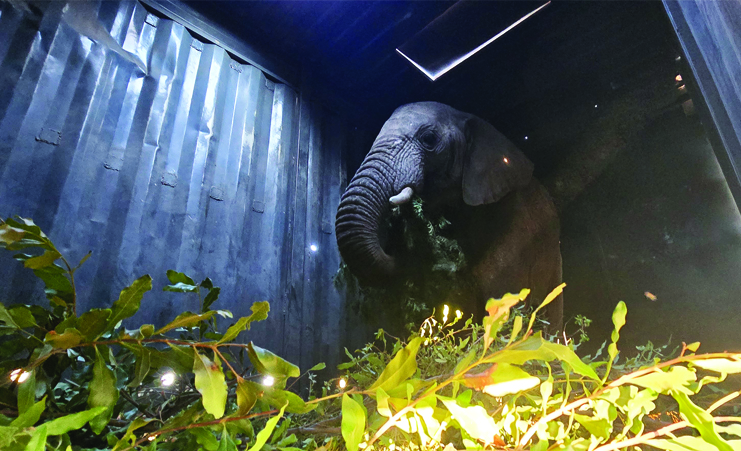A new beginning is always promising, especially when it involves finding a new home for a group of elephants.
Thanks to a professional team, a year of preparation, international funding and four weeks of intensive back-breaking journeys, the 26 elephants from Mount Etjo Safari Lodge have found themselves in the lush Cuatir Nature Reserve in south-eastern Angola, the area hadn’t seen elephants for 50 years due to the ravages of the civil war and indiscriminate poaching.
The happy ending had its beginnings many years ago when 10 orphaned calves from the Olifantsrus cull in Etosha National Park found a home at the lodge at the request of Jan and Annette Oelofse.
It was 1985, the year their son Alex was born, and the youngsters – ranging in age from there and a half to eight years – grew up alongside him. Without leadership they had some adventures and growing pains, until, with the addition of a few elephants from other areas, they left their naughty years behind them, found their feet and a safe home, and formed a well-balanced herd.
Nearly 40 years – and a seven-year drought – later, the elephant population exceeded the carrying capacity of the 3 600 km2, and a new home was sought for half the herd.
Some of Mount Etjo’s giraffes and kudus had previously been relocated to Cuatir Nature Reserve in Angola, a haven of mopane forest and floodplains, and they asked owner Stephan van Wyk if he was interested in offering a home to the small family group of elephants.
And so began a detailed operation last month that included a team of two veterinarians (Drs HO Reuter and Ulf Tubbesing), one veterinary assistant (Mariska Bijsterbosch) and competent hands-on men (Frank Schatz and Apollo Kaature) under Alex’s leadership.
Annette and Alex realised from the start that they needed the best team possible for the relocation to be successful.
It required meticulous organisation for the elephants to be darted at first light and transported northwards to reach the Katwitwi border post, 540km away, before it closed at 19h00.
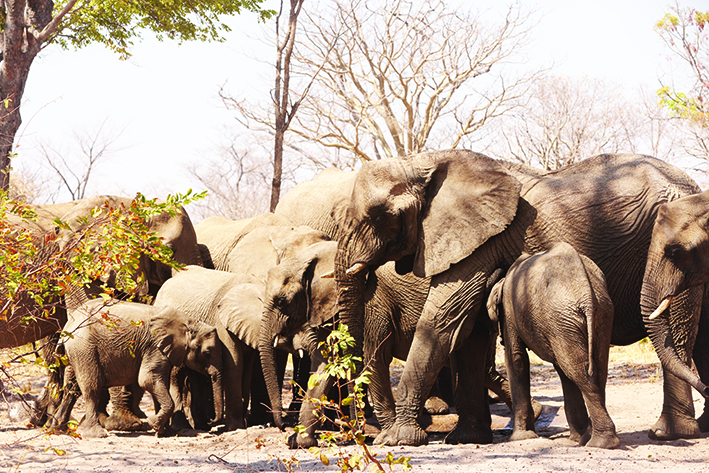
They would then have to make the 100km trip through the Angolan countryside during the night before crossing the Cubango River in the early morning to negotiate the last 40km of soft sand in daylight.
Making the journey as stress-free as possible for the elephants necessitated getting them to Cuatir as quickly as possible was the team’s priority.
The relocation was planned to take four consecutive weeks, with no more than eight elephants being transported at one time.
The family group to be relocated was identified beforehand, the necessary permits from both countries and Convention on International Trade in Endangered Species of Wild Fauna and Flora (Cites) obtained and every detail taken into consideration.
The team was ready. The first trip, however, didn’t work out quite as smoothly as they had hoped.
According to plan, they were up early on that first day. At first light, Alex flew the helicopter with the vets on board to dart the first seven elephants.
They were lifted by crane and woke up peacefully in the wake-up crates before walking into the trucks for the journey to the border.
Along the way, branches were cut to keep them well fed and they were watered at the border to arrive at their destination nourished and hydrated.
All was going well until they discovered that the equipment they had organised on the Angolan side wasn’t suitable for the last 40km of sandy road.
They had to put their heads together, improvise and go into crisis management to make it through with the elephants.
They got bogged down in the sand repeatedly.
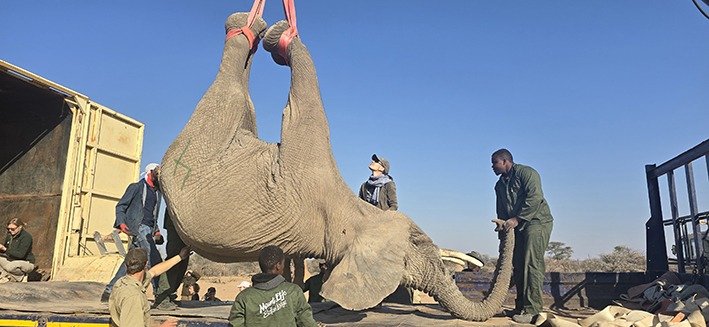
The stretch that they had worked out on their recce and would take the five to six hours, took 27. The team went for 44 hours without sleep, working overtime, until they got stuck once again 2km before the offloading ramp at Cuatir.
They couldn’t go on. They took a three-hour break in the early hours and the next morning managed the last stretch to offload the elephants.
The elephants had thankfully remained calm throughout, so much so that the young bull stopped and slowly debarked a tree after being offloaded before moving off into the trees, and the cow and calf slowly sauntered off, stopping to look back at the trucks before they too disappeared into the forest. These were emotional moments for the exhausted and grateful crew.
On the return trip, they experienced puncture after puncture from all the tree branches that they had placed in the road on the way there to get them out of the soft sand.
The week afterwards would have to be devoted to figuring out how to recover their truck and the trailer, which had been submerged in the river. Their contact in Angola had abandoned the project completely, leaving them in the lurch.
When they got back to Mount Etjo Lodge, there was no time to waste as they had to source a 6×6 truck in a few days to be able to make the next trip with the elephants on their own.
They found a 6×6 truck to hire at short notice and came up with an idea to place conveyor-belt tracks on the truck tyres to be able to negotiate the soft sand.
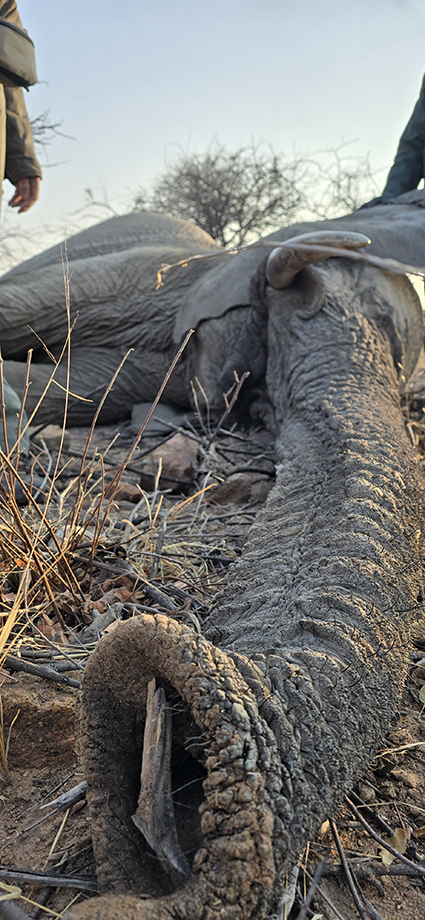
Part of the team then headed off to recover the truck and trailer in Angola. The trailer had been retrieved from the river, but was covered in silt and required a clean-up.
They fitted the tracks on the truck and did the final adjustments for the last stretch, which now would take them the five hours they initially planned, using only one 6×6 truck instead of three.
They returned to prep for the second capture and trip, doing some more last-minute repairs. While the recovery trip was underway, the rest of the team had been busy building a second set of tracks.
The consecutive trips went increasingly easier as they learnt something new each time and sorted out all the niggles. It was on the third trip that they witnessed a release that would stay with them forever.
Once the elephants were offloaded, they moved off slowly stopping 100m away and just standing there.
Eventually the team had to start cleaning the trucks to prepare for the trip home.
The elephants were impervious to the noise and commotion around them. Ten minutes later, the crew noticed an elephant walk towards the newly released group.
It was followed by all the Mount Etjo elephants that had already been relocated emerging from the forest to greet them in a warm welcome.
Everybody stopped what they were doing, sat next to the offloading ramps and watched the incredible heartwarming reunion. They all had tears streaming down their faces.
On the final trip, with only four elephants and one truck, everything went quickly, and they managed to reach the offloading ramp by 10h00 the following day.
The difficulties weren’t quite over, however, and on the return trip they got stuck in the dunes once again.
When they had finally negotiated the stretch of soft sand and the river crossing, it was time for big hugs and high fives.
They had made it, and besides the stresses and challenges experienced by the human team, the elephants had all arrived safely and calmly.
It was a triumphant endeavour that may not have been as successful without the fluidity of the team, who contributed and complemented each other seamlessly, each adding their strengths when needed.
Thanks are also due to Ministry of Environment, Forestry and Tourism, the state vets and the border control at Katwitwi and on the Angolan side for their efficiency, contributing to a smooth passage for the elephants.
It was an adventure to last a lifetime and a new beginning for a family group of elephants in an area where, after a long absence, the trumpeting of elephants could once again be heard.
The relocation continues the Oelofse’s legacy of capturing and releasing wildlife to establish new herds and investing in the next generation.
We salute everyone involved for their hard work and dedication.
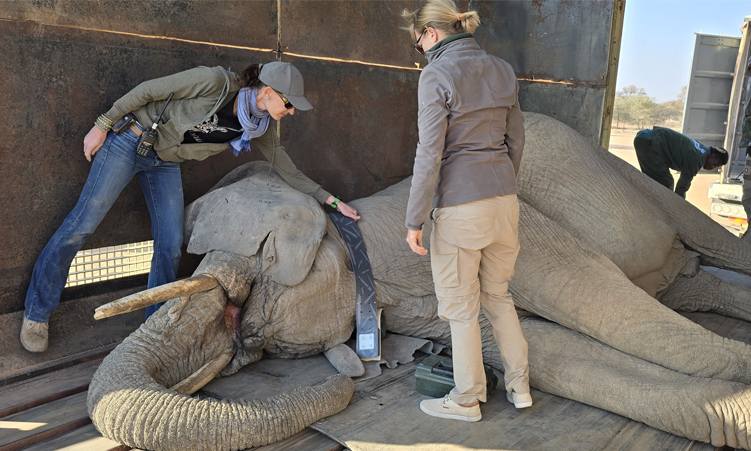
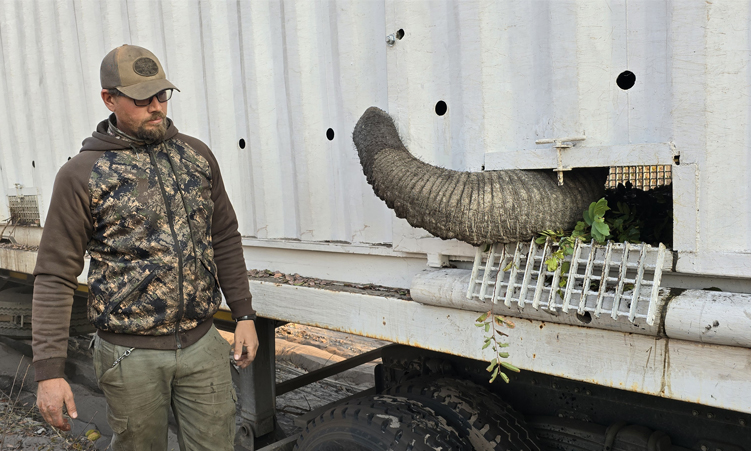
Stay informed with The Namibian – your source for credible journalism. Get in-depth reporting and opinions for
only N$85 a month. Invest in journalism, invest in democracy –
Subscribe Now!



